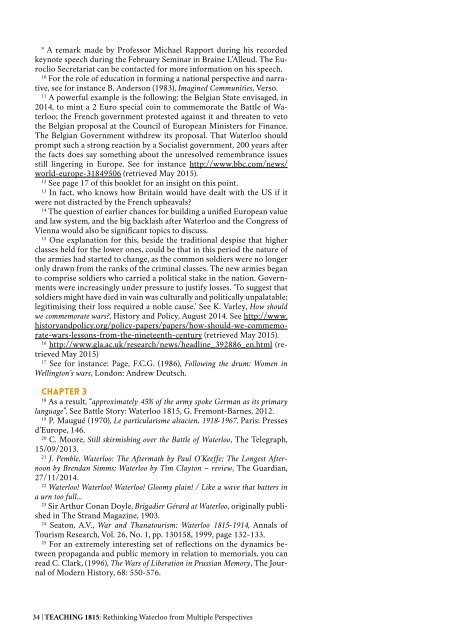Teaching 1815 - Rethinking Waterloo from multiple perspectives (Francesco Scatigna, EUROCLIO)
Teaching 1815 - Rethinking Waterloo from multiple perspectives (Francesco Scatigna, EUROCLIO)
Teaching 1815 - Rethinking Waterloo from multiple perspectives (Francesco Scatigna, EUROCLIO)
Create successful ePaper yourself
Turn your PDF publications into a flip-book with our unique Google optimized e-Paper software.
9<br />
A remark made by Professor Michael Rapport during his recorded<br />
keynote speech during the February Seminar in Braine L’Alleud. The Euroclio<br />
Secretariat can be contacted for more information on his speech.<br />
10<br />
For the role of education in forming a national perspective and narrative,<br />
see for instance B. Anderson (1983), Imagined Communities, Verso.<br />
11<br />
A powerful example is the following: the Belgian State envisaged, in<br />
2014, to mint a 2 Euro special coin to commemorate the Battle of <strong>Waterloo</strong>;<br />
the French government protested against it and threaten to veto<br />
the Belgian proposal at the Council of European Ministers for Finance.<br />
The Belgian Government withdrew its proposal. That <strong>Waterloo</strong> should<br />
prompt such a strong reaction by a Socialist government, 200 years after<br />
the facts does say something about the unresolved remembrance issues<br />
still lingering in Europe. See for instance http://www.bbc.com/news/<br />
world-europe-31849506 (retrieved May 2015).<br />
12<br />
See page 17 of this booklet for an insight on this point.<br />
13<br />
In fact, who knows how Britain would have dealt with the US if it<br />
were not distracted by the French upheavals?<br />
14<br />
The question of earlier chances for building a unified European value<br />
and law system, and the big backlash after <strong>Waterloo</strong> and the Congress of<br />
Vienna would also be significant topics to discuss.<br />
15<br />
One explanation for this, beside the traditional despise that higher<br />
classes held for the lower ones, could be that in this period the nature of<br />
the armies had started to change, as the common soldiers were no longer<br />
only drawn <strong>from</strong> the ranks of the criminal classes. The new armies began<br />
to comprise soldiers who carried a political stake in the nation. Governments<br />
were increasingly under pressure to justify losses. ‘To suggest that<br />
soldiers might have died in vain was culturally and politically unpalatable;<br />
legitimising their loss required a noble cause.’ See K. Varley, How should<br />
we commemorate wars?, History and Policy, August 2014. See http://www.<br />
historyandpolicy.org/policy-papers/papers/how-should-we-commemorate-wars-lessons-<strong>from</strong>-the-nineteenth-century<br />
(retrieved May 2015).<br />
16<br />
http://www.gla.ac.uk/research/news/headline_392886_en.html (retrieved<br />
May 2015)<br />
17<br />
See for instance: Page, F.C.G. (1986), Following the drum: Women in<br />
Wellington’s wars, London: Andrew Deutsch.<br />
Chapter 3<br />
18<br />
As a result, “approximately 45% of the army spoke German as its primary<br />
language”. See Battle Story: <strong>Waterloo</strong> <strong>1815</strong>, G. Fremont-Barnes, 2012.<br />
19<br />
P. Maugué (1970), Le particularisme alsacien, 1918-1967. Paris: Presses<br />
d’Europe, 146.<br />
20<br />
C. Moore, Still skirmishing over the Battle of <strong>Waterloo</strong>, The Telegraph,<br />
15/09/2013.<br />
21<br />
J. Pemble, <strong>Waterloo</strong>: The Aftermath by Paul O’Keeffe; The Longest Afternoon<br />
by Brendan Simms; <strong>Waterloo</strong> by Tim Clayton – review, The Guardian,<br />
27/11/2014.<br />
22<br />
<strong>Waterloo</strong>! <strong>Waterloo</strong>! <strong>Waterloo</strong>! Gloomy plain! / Like a wave that batters in<br />
a urn too full...<br />
23<br />
Sir Arthur Conan Doyle, Brigadier Gérard at <strong>Waterloo</strong>, originally published<br />
in The Strand Magazine, 1903.<br />
24<br />
Seaton, A.V., War and Thanatourism: <strong>Waterloo</strong> <strong>1815</strong>-1914, Annals of<br />
Tourism Research, Vol. 26, No. 1, pp. 130158, 1999, page 132-133.<br />
25<br />
For an extremely interesting set of reflections on the dynamics between<br />
propaganda and public memory in relation to memorials, you can<br />
read C. Clark, (1996), The Wars of Liberation in Prussian Memory, The Journal<br />
of Modern History, 68: 550-576.<br />
34 | TEACHING <strong>1815</strong>: <strong>Rethinking</strong> <strong>Waterloo</strong> <strong>from</strong> Multiple Perspectives


